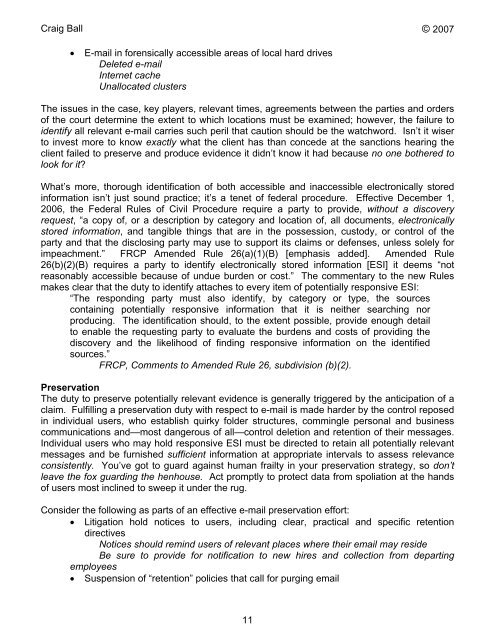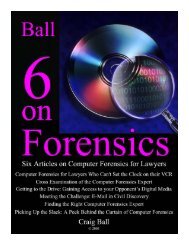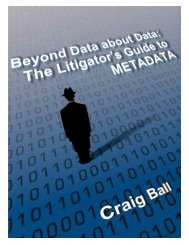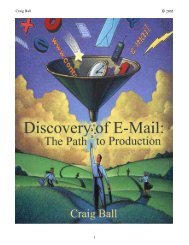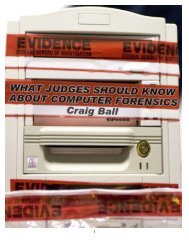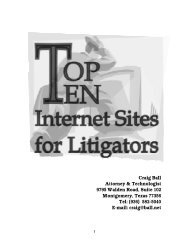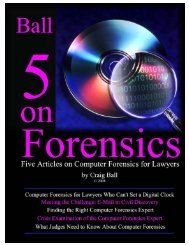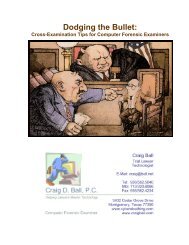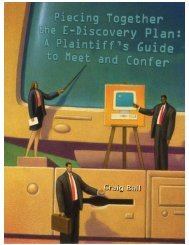Six Articles on Electronic - Craig Ball
Six Articles on Electronic - Craig Ball
Six Articles on Electronic - Craig Ball
Create successful ePaper yourself
Turn your PDF publications into a flip-book with our unique Google optimized e-Paper software.
<strong>Craig</strong> <strong>Ball</strong> © 2007<br />
• E-mail in forensically accessible areas of local hard drives<br />
Deleted e-mail<br />
Internet cache<br />
Unallocated clusters<br />
The issues in the case, key players, relevant times, agreements between the parties and orders<br />
of the court determine the extent to which locati<strong>on</strong>s must be examined; however, the failure to<br />
identify all relevant e-mail carries such peril that cauti<strong>on</strong> should be the watchword. Isn’t it wiser<br />
to invest more to know exactly what the client has than c<strong>on</strong>cede at the sancti<strong>on</strong>s hearing the<br />
client failed to preserve and produce evidence it didn’t know it had because no <strong>on</strong>e bothered to<br />
look for it?<br />
What’s more, thorough identificati<strong>on</strong> of both accessible and inaccessible electr<strong>on</strong>ically stored<br />
informati<strong>on</strong> isn’t just sound practice; it’s a tenet of federal procedure. Effective December 1,<br />
2006, the Federal Rules of Civil Procedure require a party to provide, without a discovery<br />
request, “a copy of, or a descripti<strong>on</strong> by category and locati<strong>on</strong> of, all documents, electr<strong>on</strong>ically<br />
stored informati<strong>on</strong>, and tangible things that are in the possessi<strong>on</strong>, custody, or c<strong>on</strong>trol of the<br />
party and that the disclosing party may use to support its claims or defenses, unless solely for<br />
impeachment.” FRCP Amended Rule 26(a)(1)(B) [emphasis added]. Amended Rule<br />
26(b)(2)(B) requires a party to identify electr<strong>on</strong>ically stored informati<strong>on</strong> [ESI] it deems “not<br />
reas<strong>on</strong>ably accessible because of undue burden or cost.” The commentary to the new Rules<br />
makes clear that the duty to identify attaches to every item of potentially resp<strong>on</strong>sive ESI:<br />
“The resp<strong>on</strong>ding party must also identify, by category or type, the sources<br />
c<strong>on</strong>taining potentially resp<strong>on</strong>sive informati<strong>on</strong> that it is neither searching nor<br />
producing. The identificati<strong>on</strong> should, to the extent possible, provide enough detail<br />
to enable the requesting party to evaluate the burdens and costs of providing the<br />
discovery and the likelihood of finding resp<strong>on</strong>sive informati<strong>on</strong> <strong>on</strong> the identified<br />
sources.”<br />
FRCP, Comments to Amended Rule 26, subdivisi<strong>on</strong> (b)(2).<br />
Preservati<strong>on</strong><br />
The duty to preserve potentially relevant evidence is generally triggered by the anticipati<strong>on</strong> of a<br />
claim. Fulfilling a preservati<strong>on</strong> duty with respect to e-mail is made harder by the c<strong>on</strong>trol reposed<br />
in individual users, who establish quirky folder structures, commingle pers<strong>on</strong>al and business<br />
communicati<strong>on</strong>s and—most dangerous of all—c<strong>on</strong>trol deleti<strong>on</strong> and retenti<strong>on</strong> of their messages.<br />
Individual users who may hold resp<strong>on</strong>sive ESI must be directed to retain all potentially relevant<br />
messages and be furnished sufficient informati<strong>on</strong> at appropriate intervals to assess relevance<br />
c<strong>on</strong>sistently. You’ve got to guard against human frailty in your preservati<strong>on</strong> strategy, so d<strong>on</strong>’t<br />
leave the fox guarding the henhouse. Act promptly to protect data from spoliati<strong>on</strong> at the hands<br />
of users most inclined to sweep it under the rug.<br />
C<strong>on</strong>sider the following as parts of an effective e-mail preservati<strong>on</strong> effort:<br />
• Litigati<strong>on</strong> hold notices to users, including clear, practical and specific retenti<strong>on</strong><br />
directives<br />
Notices should remind users of relevant places where their email may reside<br />
Be sure to provide for notificati<strong>on</strong> to new hires and collecti<strong>on</strong> from departing<br />
employees<br />
• Suspensi<strong>on</strong> of “retenti<strong>on</strong>” policies that call for purging email<br />
11


